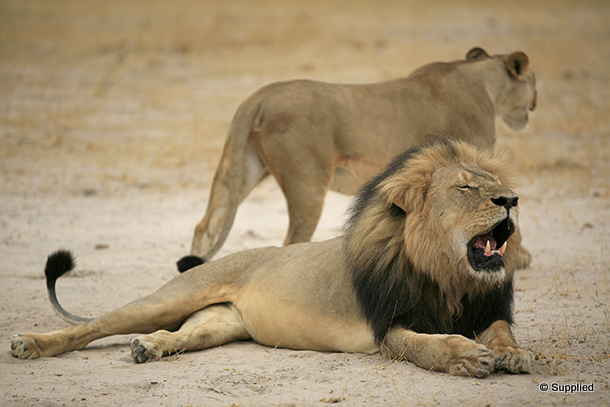
HARARE — Zimbabwe’s lucrative safari industry – including trophy hunting – is worth an estimated $200 million a year, but it has been plunged into fresh uncertainty after authorities confirmed two deaths involving big game in Hwange and Victoria Falls parks.
As if atoning for last month’s killing of Zimbabwe’s famous lion, Cecil, male lions in Zimbabwe’s Hwange National Park have mauled a tour guide to death.
President Robert Mugabe said last Tuesday in his State of the Nation Address that the tourism industry was “experiencing tremendous growth”.
Safari operators and other tourism players are now pressing for a revamp in the country’s safari and trophy hunting standards and best practices.
The government has since lifted a temporary ban on the trophy hunting of lions, leopard and other big game after the killing of Cecil.
Emmanuel Fundira, the president of the Zimbabwe safari operators, said the industry was lucrative and generated more than $200m a year.
However, only about 10 percent of this goes to community projects.
“There is growing need for stakeholders to look into the industry. We need transparency and accountability so that communities and the broader tourism sector can also benefit unlike the current situation where only a few players are benefiting,” said a stakeholder advocating for communities to get more out of the proceeds generated from the sector.
- Chamisa under fire over US$120K donation
- Mavhunga puts DeMbare into Chibuku quarterfinals
- Pension funds bet on Cabora Bassa oilfields
- Councils defy govt fire tender directive
Keep Reading
The killing of Cecil the lion generated global interest, but for Zimbabweans back home, there was little interest.

Their interest lies elsewhere, as they grapple with a worsening economic situation that has seen more than 20 000 workers lose their jobs.
Deaths confirmed
Authorities confirmed the mauling of tour guide Quinn Swales by lions in Hwange National Park on Monday while also confirming the trampling to death of a 32-year-old man by an elephant in Victoria Falls.
“On August 24, Quinn . . . was with six foreign guests. He spotted fresh lion spoor and decided to track a pride of lions consisting of two females, two cubs and two males. “One of the lions known as Nxaha was collared. Nxaha jumped out at Quinn (and) . . . all efforts to save Quinn were in vain,” the Parks and Wildlife Management Authority of Zimbabwe said last week.
These incidents have put Zimbabwe’s wildlife and safari sector back in the spotlight.
Sources in the country say the industry is controlled by wealthy and well-connected individuals who are benefiting from it but disregarding standards and best practice.
National Geographic said in an article on Tuesday that the country’s wildlife situation was being worsened by the hunting of vulnerable lion populations.
This again stoked the debate on trophy hunting, with the report adding that wild lions in Zimbabwe “are in trouble”.
However, trophy hunting in Zimbabwe, said the National Geographic report, was apparently big business in Africa.
Zimbabwe reportedly has between 60 and 70 trophy hunts each year, with other experts saying each trophy hunt can be worth as much as $50 000.
Zimbabwe Tourism Authority chief executive Karikoga Kaseke said in May that the country had registered an improvement in its ranking on the World Economic Forum’s travel and tourism competitiveness index.
Zimbabwe’s ranking had firmed from 136 in 2010 to 115 out of 141 this year. — online










